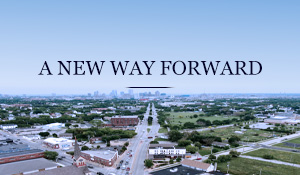Editor’s note: Have something on your mind? “Community Voices” is the place to let Milwaukee hear what you have to say. To be considered, we need your name, email address and phone number for verification. Please email your submissions to info@milwaukeenns.org.
“Can you please help my business? Most of all, I’m worried about my employees and their families during this shutdown. Please help us if you can.”
A concerned small business owner said this to me on the phone, sounding calm and understandably desperate at the same time.
This phone call, and many others like it throughout the pandemic, served as the fire that lit me every day. My heart ached for what these businesses went through. The clock these small businesses were up against did not stop ticking when it came to paying their bills, feeding their families and their employees.

A New Way Forward
This is the fifth in a series of “Community Voices” that invites our neighbors to share what they’ve learned during the pandemic and their visions for a better Milwaukee.
Many business owners told me they were experiencing great success just before the mandatory shutdowns, then suddenly, they faced the possibility of permanently closing the doors to their businesses without financial support.
Most businesses in Milwaukee that the Hmong Wisconsin Chamber of Commerce work with are microbusinesses with one to two total employees. A majority of them have narrow profit margins and hiring an accountant to help produce formal business financials on a regular basis just does not happen. The number of businesses with strong relationships with financial institutions are few. In fact, many of these owners do not have separate personal and business banking accounts because the sizes of their businesses don’t yet justify a need.
I remember very well talking to a microbusiness owner with a shop at the 5Xen Market on Milwaukee’s Northwest Side. She started a business because her friends told her she should — she loved apparel. It seemed to make sense for her to open a shop, so she simply did it. She did not know how to create business financials, nor did she have someone who did them for her. She knew that she made enough profit to keep her store open and to support her family.
When grants were announced to keep businesses afloat, it was a relief, but made obvious the disparities between businesses that had established connections and documents, and those that did not — many of whom represent the ethnic and diverse microbusinesses we work with. Business financials were necessary to apply for most of the grants. Language and cultural barriers only compounded the challenges faced by some small business owners.
Our chamber spoke with funders and helped businesses create the required paperwork to qualify for funds. We quickly saw how businesses with existing relationships to financial institutions were at an advantage over those that did not, so we pivoted. We created webinars guiding our clients and other businesses based on what we heard and saw. Our staff traveled to several areas around the state to directly assist business owners with grant applications. It was gratifying to know we could be of assistance to many and yet, we wish we could have done more.
A small Asian grocery store business owner called me two and half weeks after the first round of PPP funds became available. Funds in the program quickly depleted, pretty much the moment they were announced. This business owner had limited knowledge of English but has been in business for at least two decades. His business consists of mostly Asian food products, ranging from seasonings to produce, cookware to ready-made Asian deli foods.
Initially, he hoped to weather the pandemic without financial assistance but eventually realized the end of the pandemic was nowhere in sight and he needed funding to avoid closing permanently. He told me that he heard about funds available for businesses like his and wondered if I could help him access them. My heart dropped instantly. I said, “Uncle, the grants are no longer there, at least for the moment. They were available but they depleted very quickly. We’ve been announcing these funds — why didn’t you call me earlier?” He responded, “I had hoped we would not have to ask for assistance.”
The deep pride embedded in many minority business owners was evident not only in him, but numerous others we came across. It’s businesses like his that we aimed to quickly reach from the start of the pandemic, and yet, it was clear that the countless hours our team of six put into reaching out around the state, however impactful, had still not been enough. The truth is that I’m not sure it would have ever felt like enough.
I heard several economists express that the smallest businesses would not survive, but I could not believe this to be the truth. After all, the Hmong Wisconsin Chamber of Commerce exists to help make dreams come true for those who America often said had no chance of being successful in business yet have succeeded over and over again because of their resilience.
Thankfully, many of these “most vulnerable” businesses found ways to pivot on their own. Several of our clients with food businesses were able to successfully establish carryout for the first time. Many learned to sell online. Being able to do so did not require having to know perfect English. It turns out, these business owners were able to reach their targets markets even better than when they only relied on in-store sales.
One of the greatest lessons I’ve learned throughout this pandemic is that resilience through adversity is alive and well. All of us are more adaptable than we think we can be when faced with challenges of survival.
I envision a future where everyone, regardless of our differences, has equitable access to resources without being afraid to ask for assistance. Not being afraid requires having people in organizations that diverse business owners can identify with and trust. When there is representation present in our organizations, it does not only feel right, but ultimately contributes to our bottom lines — it’s good for business.
I envision a community where our aspiring business owners and entrepreneurs use their cultural wealth to leverage their business. The diversity of their languages, food and ways of being are perceived as gifts to the community, and ultimately, contribute to the economic well-being of the region in ways that we know they can, based on what we’ve seen in other parts of the country and world.
I envision a community where our financial institutions use a more innovative lens and open doors to aspiring business owners and entrepreneurs. Other than credit scores and assets in a bank account, what other ways can we determine the potential for success in individuals?
For our many historically underserved and underinvested communities, there is a saying In Hmong: “Txhob ua sab dleb,” which means, “Don’t let your heart be distant.” The work we do at Hmong Wisconsin Chamber of Commerce and many of our fellow ethnic chambers is work of the heart. We meet potential business owners where they’re at in their dreams of starting a business and help them progress in the right direction.
I’ve been asked if I regret my decision to take on leading Hmong Wisconsin Chamber of Commerce when I did, right before the pandemic. My answer: I’m right where I’m supposed to be, helping our small businesses in the underserved communities during this most challenging time. I wouldn’t have it any other way.
Maysee Herr is a longtime Wisconsinite who is a passionate community advocate, educator and business executive, led by a life mission to bring about equity to people in underserved and underinvested communities.



